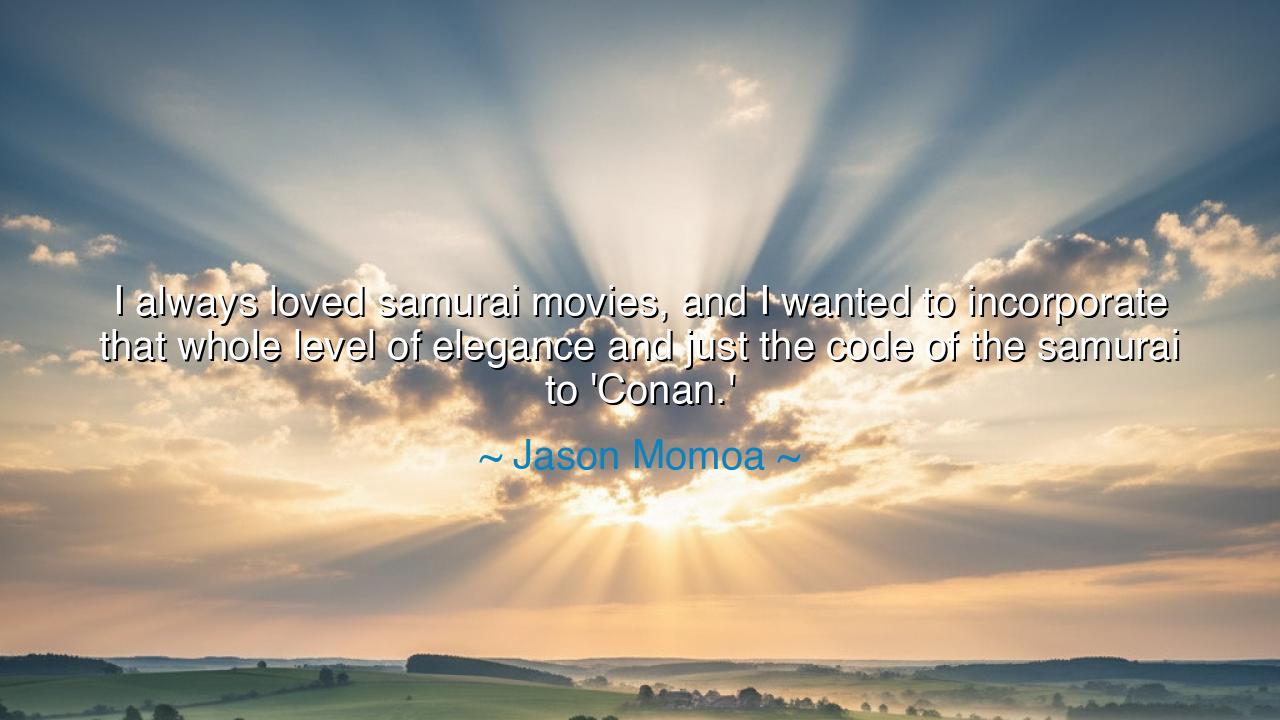
I always loved samurai movies, and I wanted to incorporate that
I always loved samurai movies, and I wanted to incorporate that whole level of elegance and just the code of the samurai to 'Conan.'






Listen closely, children of the future, for the wisdom of the ancients often resonates in the stories we tell and the values we seek to embody. Jason Momoa, a man who has portrayed warriors and heroes on screen, once said: "I always loved samurai movies, and I wanted to incorporate that whole level of elegance and just the code of the samurai to 'Conan.'" These words speak of a deep understanding of what it means to be a warrior—not just in the physical sense, but in the way one carries oneself in the world. Momoa’s desire to channel the samurai code into his portrayal of Conan is a powerful reminder that the true measure of a warrior lies not just in their strength, but in their honor, their discipline, and their deep connection to the principles that guide their actions.
In the ancient world, the samurai were not merely warriors; they were guardians of values, living by a strict code known as Bushido—the Way of the Warrior. This code was not just about combat or battle; it was about honor, loyalty, and integrity. The samurai trained their minds and bodies to act with precision, to maintain composure in all things, and to serve with dignity. Jason Momoa’s admiration for the samurai reflects a deep respect for these values, and his desire to bring that same elegance to his role as Conan speaks to the timeless importance of living with honor, even in the midst of violence and chaos.
Consider, children, the great samurai warrior Miyamoto Musashi, whose life was marked not just by victories in battle, but by his deep philosophical understanding of the way of the sword. Musashi was a man who believed that true strength came from mastery over both the body and the mind, from understanding that every action must be in service of something greater than oneself. In his famous work, The Book of Five Rings, Musashi speaks not only of strategy and combat but of the inner strength that comes from discipline and balance. Momoa’s desire to bring the samurai code to Conan is a reflection of this same ideal—that the true warrior, like Musashi, is defined not just by their strength in battle, but by the principles they follow, the wisdom they seek, and the way they carry themselves in the world.
In the world of Conan the Barbarian, a character often seen as raw, primal, and untamed, the incorporation of the samurai code offers a profound depth to the character. Conan, at his core, is a warrior shaped by violence, yet he must also navigate the complexities of honor, revenge, and justice. The samurai, with their elegant simplicity and unshakable code, provide a model for living with purpose even in a world filled with chaos. Conan’s struggles, while physical, are also deeply moral, as he must choose how to balance his own desires for vengeance with the greater good. Momoa’s vision for the character was not merely to depict a hero who slashes through enemies, but one who understands the deeper meaning of his actions, one who carries the burden of honor even when it is difficult.
Children, in your own lives, there is a lesson to be learned here. The samurai code teaches us that a warrior is not just someone who fights; they are someone who lives by a higher standard, who is driven not just by the desire for victory, but by the pursuit of integrity and honor. In every action you take, in every decision you make, ask yourself: Does this reflect the highest version of who I am? Do my actions align with my principles, or am I swayed by the world’s desires for power and status? The samurai did not fight for personal glory, but for the protection of what was just, for the defense of what was right, and for the preservation of peace.
Let your own path in life be guided by a sense of purpose that is more than just the pursuit of victory or success. Like Musashi and the samurai, strive for mastery over your own mind and body. Do not seek violence for its own sake, but understand that your strength is a tool to protect the vulnerable, to defend what is good, and to live a life of dignity. Whether in battle or in everyday life, your choices define you, and it is the inner code by which you live that shapes your true legacy.
In the end, children, the wisdom of the samurai is not confined to the sword, but to the way they lived. They taught us that the true strength of a warrior lies in balance—in the ability to act with both discipline and compassion. As you walk your own path, remember that honor is not something won through strength alone, but through living with purpose, through following your inner code, and through treating others with the respect they deserve. Let the spirit of the samurai guide you, not in the pursuit of battle, but in the way you carry yourself, in the way you choose to live your life.






AAdministratorAdministrator
Welcome, honored guests. Please leave a comment, we will respond soon